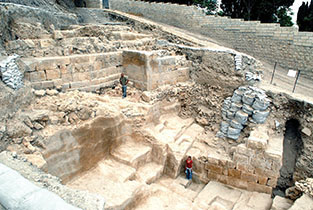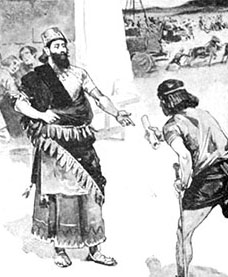
by: Abigail Gilbert, BFP Staff Writer
“Fight for your brethren, your sons, your daughters, your wives, and your houses.” Doesn’t that sound like the rally cry from a theatrical battle scene? You can just visualize a general riding up and down the lines of horsemen, sword drawn, calling every man to stand shoulder-to-shoulder in defense of what he loves most. Yet in actual fact, those inspirational words were spoken thousands of years ago by Nehemiah, encouraging the people rebuilding the ruined city of Jerusalem to stand strong against what looked like insurmountable odds (Neh. 4:14).
In 444 BC, Nehemiah, the cup-bearer to King Artaxerxes of Persia, learned that the remnant of Jews in Judah was in distress and that the walls of Jerusalem were broken. He asked the king for permission to return and rebuild the city. He was granted leave to go, and once in Jerusalem, he defied the opposition of Judah’s enemies on all sides and rebuilt the walls within 52 days.
From day one, Nehemiah treated the wall as a priority. Without this solid defense, the community inside was vulnerable. As soon as the work began, Judah’s enemies rose up in protest. As long as the Jews within Jerusalem were picking their way through a ruined city, there didn’t seem much to worry about, but once the people unified under a common cause and made an effort to rebuild their heritage, their strength posed a threat to surrounding nations.
Let’s take a look at what the book of Nehemiah and the remarkable story of rebuilding the ancient ruins can teach us today about the importance of strong spiritual walls, a solid defense against the enemy and what it means to stand in the gap for those we love.
In the first chapter of the book bearing his name, Nehemiah goes alone to the gates of Jerusalem and finds the area in ruins. Appalled, he returns to the people and says to them, “You see the distress that we are in, how Jerusalem lies waste, and its gates are burned with fire. Come and let us build the wall of Jerusalem, that we may no longer be a reproach” (Neh. 2:17). He then encourages the people by telling them of God’s faithfulness and of the favor King Artaxerxes showed him—further proof that the hand of God was with them.
This appeal for people to stand in the gap and rebuild the wall is echoed in a different context in Ezekiel, when God pleads for someone to rise up and intercede as an intermediary between the sinful Israel and His holy wrath. “So I sought for a man among them who would make a wall, and stand in the gap before Me on behalf of the land, that I should not destroy it; but I found no one” (Ezek. 22:30). In this Scripture, the Lord is describing to Ezekiel the depths to which Israel has fallen, saying “Those near and those far from you will mock you as infamous and full of tumult” (v. 5), “You shall defile yourself in the sight of the nations…” (v. 16) and “…they have not distinguished between the holy and the unholy…” (v. 26). This is the spiritual equivalent of the literal destruction that Nehemiah and the people of Judah face as they struggle to rebuild Jerusalem. They are mocked and considered nothing in the eyes of the nations. The city has lost the appearance of “holiness” it once had and is now nothing more than a pile of rubble.

The ruins of Nehemiah’s wall can still be found outside the walls of modern Jerusalem. (Photo: Ashernet)
In Ezekiel 22, God calls for someone to stand up and rebuild what has become morally and spiritually decrepit. No one answers the call. This stands in stark contrast to the story of Nehemiah, when he asks for assistance and is met with immediate agreement: “So they said, ‘Let us rise up and build.’ Then they set their hands to this good work” (Neh. 2:18b). But as so often happens, movement towards the work of God is met with immediate opposition from the enemy. On all sides, the workers find themselves surrounded by armies and rulers who threaten not just the work, but the lives of the people as well.
It’s quite the laundry list of oppositional countries that come against Nehemiah and the people of Judah when they start rebuilding the wall. From the north comes Sanballat the Horonite, the governor of Samaria. Then we have Tobiah the Ammonite and Geshem the Arab.
 Pastor and theologian Wilfredo De Jesús writes in his article “In the Gap: What Happens when God’s People Stand Strong” about the symbolism each of these enemies brings to the table: compromise, divisiveness and storms. He says that Sanballat, whose name literally translates to “may sin come to life,” represents compromise: “The Samaritans bent their lives, standards, and faith to accommodate the pagans among them. It may have begun gradually, but after a few years, the Jews there had lost their distinctive faith and culture.” Tobiah the pagan Ammonite, he continues, represents division. The enemy tries to create a divided heart as well as division within the community. And Geshem, whose name means “storms” or “rain,” represents storms like addiction, abuse, abandonment, poverty, depression or shame that destroy individuals, families and communities. “For Nehemiah and for us, a half-completed wall isn’t enough protection,” De Jesús writes. “We need to finish the work, no matter what it takes.”
Pastor and theologian Wilfredo De Jesús writes in his article “In the Gap: What Happens when God’s People Stand Strong” about the symbolism each of these enemies brings to the table: compromise, divisiveness and storms. He says that Sanballat, whose name literally translates to “may sin come to life,” represents compromise: “The Samaritans bent their lives, standards, and faith to accommodate the pagans among them. It may have begun gradually, but after a few years, the Jews there had lost their distinctive faith and culture.” Tobiah the pagan Ammonite, he continues, represents division. The enemy tries to create a divided heart as well as division within the community. And Geshem, whose name means “storms” or “rain,” represents storms like addiction, abuse, abandonment, poverty, depression or shame that destroy individuals, families and communities. “For Nehemiah and for us, a half-completed wall isn’t enough protection,” De Jesús writes. “We need to finish the work, no matter what it takes.”
In Nehemiah, the enemies of Jerusalem come against the people by attacking the spirit of the builders, imputing wrong motives and showing obvious contempt for their effort. Sanballat says “What are these feeble Jews doing? Will they fortify themselves? Will they offer sacrifices? Will they complete it in a day? Will they revive the stones from the heaps of rubbish—stones that are burned?” (Neh. 4:2). He’s mocking their efforts, planting the seed of doubt that maybe all their work will be for nothing; that it would be better to quit now than continue. This also further demonstrates the implied compromise De Jesús mentions. Sanballat uses the extreme insinuation, “Will they complete it in a day?” to imply that the impossibility of the feat should discourage the people from continuing. It would be better to settle, right?
Then Tobiah the Ammonite comes alongside Sanballat and says that “Whatever they build, if even a fox goes up on it, he will break down their stone wall” (Neh. 4:3). He and the others, angry at the idea of the wall being restored and the gaps being closed, conspire to attack Jerusalem and “create confusion” (v. 8).
This still happens today. When we make attempts to rebuild what has been broken down in our personal faith walk, family and community, it invites opposition. At Bridges for Peace we talk about rebuilding crumbled bridges between Christians and Jews. That too invites opposition from all sides. It’s useful to recognize the common schemes of the enemy, such as compromise, division and life storms, that threaten to pull us from our purpose or discourage us in the battle. The more we stay dedicated to rebuilding, the stronger the walls become to defend against the enemy.

Israel Defense Forces soldiers are sworn in with a gun in one hand and a Hebrew Bible in the other. (Photo: Ashernet)
So what does Nehemiah do when the enemy draws battle lines on all sides? He recognizes the schemes of the enemy, prays against them and continues the work. This tactic serves the builders well at first, and they complete half of the wall (Neh. 4:6). Then the enemies rise again with threats and conspiracies, planning to attack and kill the workers. Still, Nehemiah is undeterred. “Therefore I positioned men behind the lower parts of the wall, at the openings; and I set the people according to their families, with their swords, their spears, and bows. And I looked, and arose and said to the nobles, to the leaders, and to the rest of the people, ‘Do not be afraid of them. Remember the Lord, great and awesome, and fight for your brethren, your sons, your daughters, your wives, and your houses’” (Neh. 4:13–14). That’s not all. Nehemiah still sends the people back to work, this time with swords strapped to their sides.
There are a few truly remarkable things in Nehemiah’s response. First, he appoints the people to stand in the gap “according to their families,” recognizing the power and motivation of the family unit standing shoulder-to-shoulder in defense of the wall. We can learn from this when facing crumbling situations, both in and outside the family. To use the age-old cliché, we’re stronger together. Nehemiah also arms the families with swords and spears before telling them to “remember the Lord” and fight for those they love most. Just a few verses later, we read that he also divides the group in half, with one half continuing the building, while the other half stands armed and ready. Even the builders, we read, “…loaded themselves so that with one hand they worked at construction, and with the other held a weapon. Every one of the builders had his sword girded at his side as he built” (Neh. 4:17–18).
Here we see that standing in the gap means carrying a sword in one hand and a trowel in the other. While the people are alert to the danger on all sides and prepared accordingly, they also don’t let the onslaught serve as a distraction from their purpose. Rabbi Naphtali Weisz and Josh Even-Chen note in The Israel Bible that a version of this approach continues today: “At the swearing-in ceremonies for the Israeli army, each soldier is handed both a gun to hold in one hand and a Hebrew Bible to hold in another.” There’s the idea of physical defense, coupled with a reminder to “do the work” and continue in their purpose as a light to the nations, submitted to the God of Abraham, Isaac and Jacob.
Today, we often get the opportunity to stand in the gap for our friends and community by interceding on their behalf. One biblical example memorialized in the Psalms is when Moses prays on behalf of the Israelites after the incident with the golden calf: “Therefore He said that He would destroy them, had not Moses His chosen one stood before Him in the breach, to turn away His wrath, lest He destroy them” (Ps. 106:23). In the Writings of the Apostles (NT) we read of another worthy intercessor: “Epaphras, who is one of you, a bondservant of Christ, greets you, always laboring fervently for you in prayers, that you may stand perfect and complete in all the will of God” (Col. 4:12). Look at the words used to describe the prayers of both Moses and Epaphras. This isn’t a weekly obligation in a church pew. This is passionate laboring in the gap on behalf of another. This intercession costs the prayer warrior something, and it gets results.
Online magazine The Word Among Us puts it well in their article, “Standing in the Gap:” “We offer to pray for someone but more often than not, we forget to pray. It becomes more like a polite way to wish someone well.” What we see described in the above Scriptures is vastly different from the half-hearted “well-wishing” of the apathetic believer. It’s as though the indifferent intercessor is a fully-equipped warrior using his sword as a staff instead of a weapon in the heat of battle. In contrast, the intercession we see modeled in the two Scriptures takes itself seriously and takes God seriously. We have as much of an exhortation to “pray without ceasing” (1 Thess. 5:17) today as there was in the time of Isaiah when God said “Those from among you shall build the old waste places; you shall raise up the foundations of many generations; and you shall be called the Repairer of the Breach, the Restorer of Streets to Dwell In” (Isa. 58:12).
As we’re thinking about answering God’s call to stand in the gap and rebuild the ancient ruins, we should look at the example He has already set for us in this regard. The book of Hebrews describes Jesus’s role as Priest: “But He, because He continues forever, has an unchangeable priesthood. Therefore He is also able to save to the uttermost those who come to God through Him, since He always lives to make intercession for them” (Heb. 7:24–25). A practical example of this appears in the Gospels, when Jesus predicts Peter’s denial: “And the Lord said, ‘Simon, Simon! Indeed Satan has asked for you, that he may sift you as wheat. But I have prayed for you, that your faith should not fail; and when you have returned to Me, strengthen your brethren” (Luke 22:31–32). This has got to be one of the scariest verses in the Bible spoken – the idea of Satan standing before God asking for Peter as he once asked for Job. I would not want to be in Peter’s shoes. But the verse immediately following is full of hope. What greater thing than to have God himself intercede on our behalf that our faith may stand? Peter still denies Jesus, but afterwards his faith becomes the rock upon which the church is built.
We also read: “Likewise the Spirit also helps in our weaknesses. For we do not know what we should pray for as we ought, but the Spirit Himself makes intercession for us with groanings which cannot be uttered. Now He who searches the hearts knows what the mind of the Spirit is, because He makes intercession for the saints according to the will of God” (Rom. 8:26–27). How can we emulate this holy example when praying for other people? Often during times of trial or darkness, it’s hard to pray. When we sit with someone through these darkest times, it can be our greatest privilege to take up the mantle of prayer for them and pray on their behalf to the Father.
God still calls us to rebuild “ruined cities” today. As we said before, those ruins can be any number of things: broken relationships, lax prayer lives or families that have fallen into disrepair. Nothing is beyond God, and He has given us a unique tool—intercession—that is both defensive against the darts of the enemy and offensive in rebuilding what was once shattered. We can learn from Nehemiah’s example when facing “opposition to the work,” whether that be people who think the brokenness is “too far gone” or simply the wiles of the enemy throwing up road blocks along the way. Nehemiah himself turns first to prayer and intercession in the face of opposition: “For they all were trying to make us afraid, saying, ‘Their hands will be weakened in the work, and it will not be done.’ Now therefore, O God, strengthen my hands” (Neh. 6:9). Nehemiah recognizes the schemes of the enemy and immediately prays for strength. May we also have a “mind to work,” and step forward to the task with Nehemiah’s prayer in our hearts: Lord strengthen our hands.
De Jesús, Wilfredo. “In the Gap: What Happens When God’s People Stand Strong.” Enrichment Journal. http://enrichmentjournal.ag.org/201404/201404_036_In_The_Gap.cfm
Guthrie, Donald et al., eds. New Bible Commentary. Leicester: Inter-Varsity Press, 1970.
“Standing in the Gap.” The Word Among Us. https://wau.org/archives/article/standing_in_the_gap/
Turnbull, Ralph G. The Book of Nehemiah. Ann Arbor: Baker Book House Company, 1968.
Weisz, Naphtali, ed.; Even-Chen, Josh, commentary. The Israel Bible: The Book of Ezra – Nehemiah. Beit Shemesh: Israel365.
All logos and trademarks in this site are property of their respective owner. All other materials are property of Bridges for Peace. Copyright © 2025.
Website Site Design by J-Town Internet Services Ltd. - Based in Jerusalem and Serving the World.